International Business Law and Ethics: Short Response Assignment
VerifiedAdded on 2022/11/16
|16
|3722
|252
Homework Assignment
AI Summary
This assignment analyzes several case studies focusing on international business law and ethics. It examines the applicability of the United Nations Convention on the Use of Electronic Communications in International Contracts to a contract between an artist and an artisan, addressing issues of electronic contract validity and the requirement for both parties to be signatories. The assignment further explores whether the transaction falls under the convention and if the Incoterm was correctly incorporated. It also delves into the legal basis for preventing the enforcement of an arbitral award, the applicability of the United Nations Convention on Contracts for the International Sale of Goods (CISG), and potential breaches of contract under the CISG. Additionally, it covers the criteria for an electronic signature's validity under the UNCITRAL Law on Model Signatures, providing a comprehensive overview of key legal and ethical considerations in international business transactions.
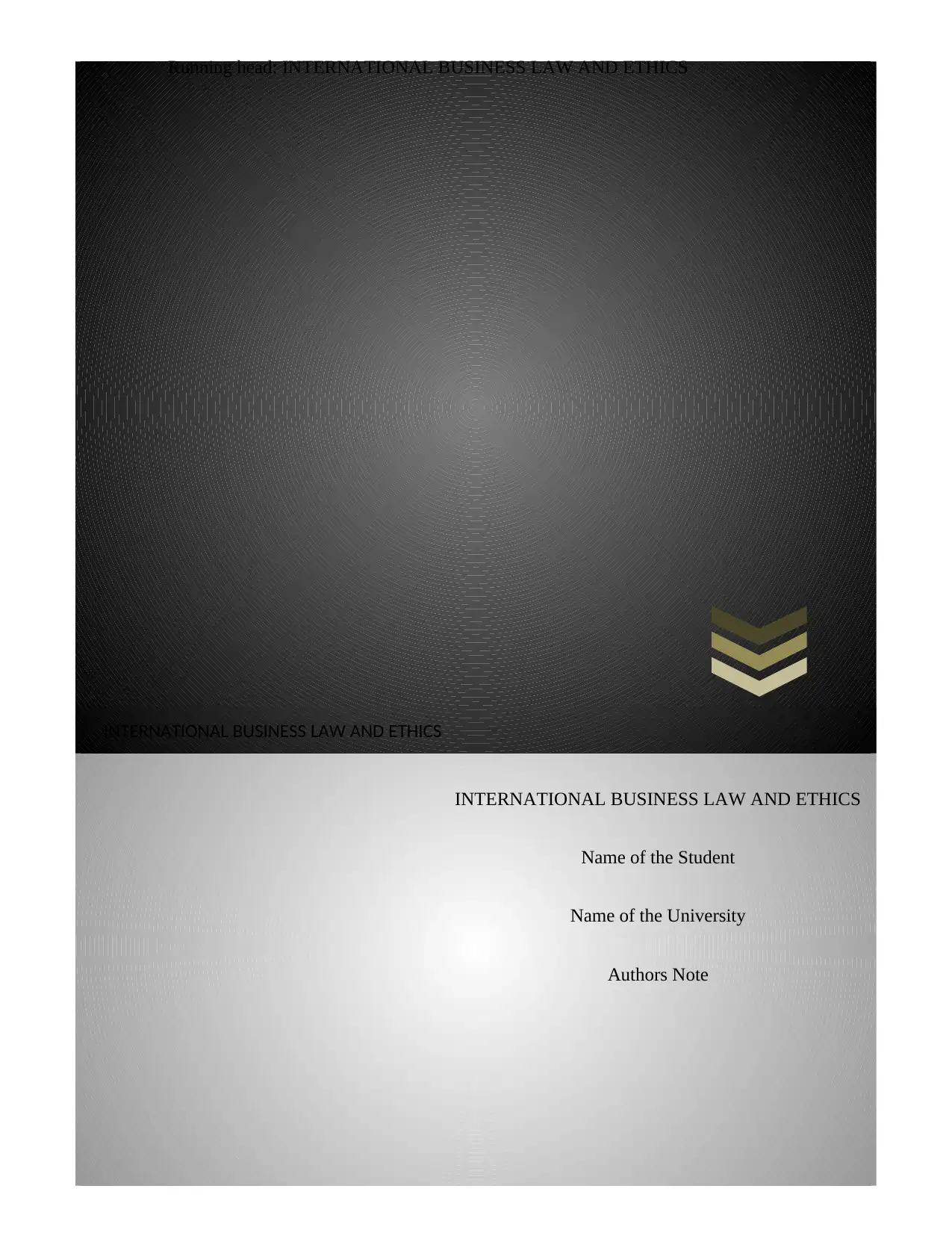
INTERNATIONAL BUSINESS LAW AND ETHICS
Running head: INTERNATIONAL BUSINESS LAW AND ETHICS
INTERNATIONAL BUSINESS LAW AND ETHICS
Name of the Student
Name of the University
Authors Note
Running head: INTERNATIONAL BUSINESS LAW AND ETHICS
INTERNATIONAL BUSINESS LAW AND ETHICS
Name of the Student
Name of the University
Authors Note
Paraphrase This Document
Need a fresh take? Get an instant paraphrase of this document with our AI Paraphraser
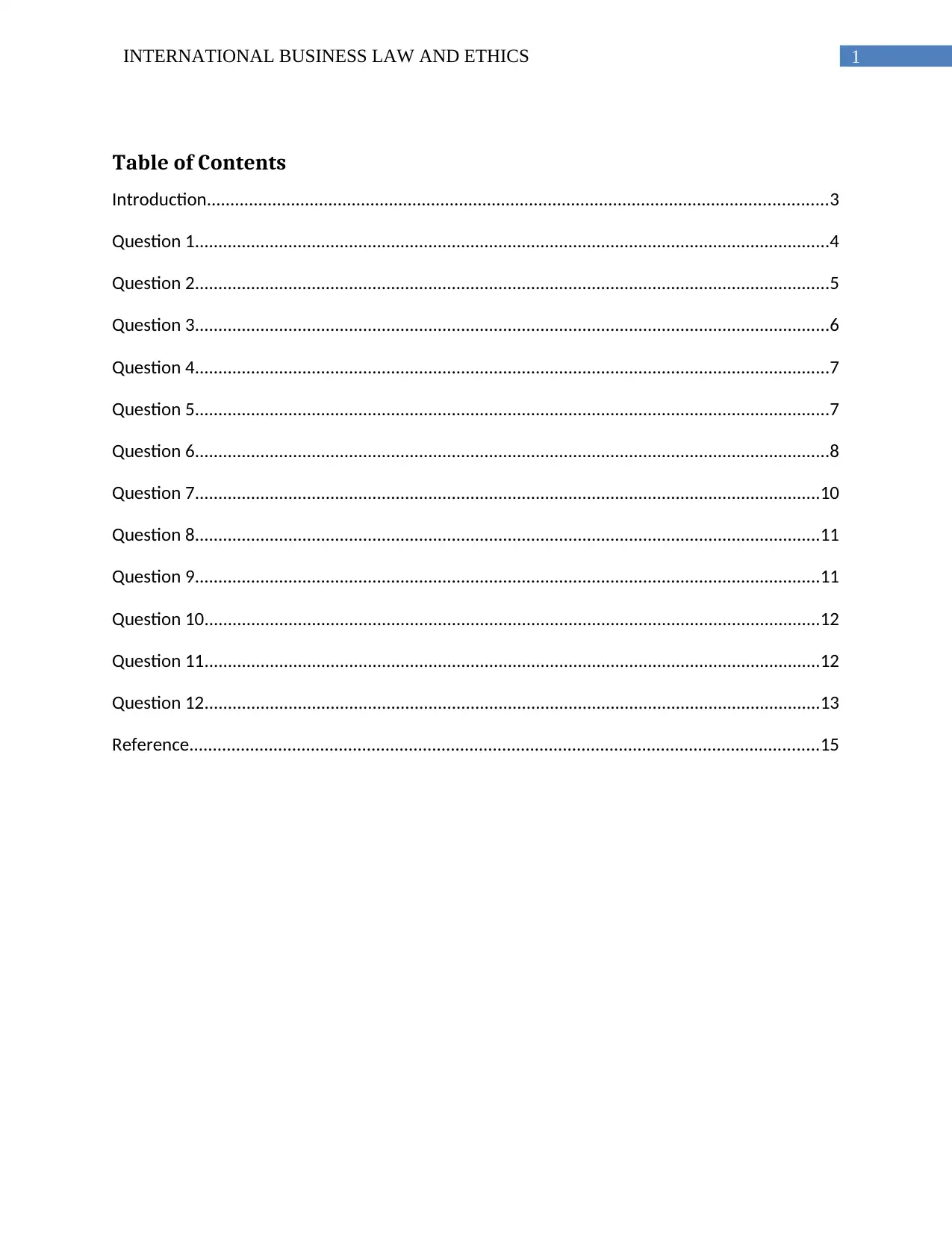
1INTERNATIONAL BUSINESS LAW AND ETHICS
Table of Contents
Introduction.....................................................................................................................................3
Question 1........................................................................................................................................4
Question 2........................................................................................................................................5
Question 3........................................................................................................................................6
Question 4........................................................................................................................................7
Question 5........................................................................................................................................7
Question 6........................................................................................................................................8
Question 7......................................................................................................................................10
Question 8......................................................................................................................................11
Question 9......................................................................................................................................11
Question 10....................................................................................................................................12
Question 11....................................................................................................................................12
Question 12....................................................................................................................................13
Reference.......................................................................................................................................15
Table of Contents
Introduction.....................................................................................................................................3
Question 1........................................................................................................................................4
Question 2........................................................................................................................................5
Question 3........................................................................................................................................6
Question 4........................................................................................................................................7
Question 5........................................................................................................................................7
Question 6........................................................................................................................................8
Question 7......................................................................................................................................10
Question 8......................................................................................................................................11
Question 9......................................................................................................................................11
Question 10....................................................................................................................................12
Question 11....................................................................................................................................12
Question 12....................................................................................................................................13
Reference.......................................................................................................................................15
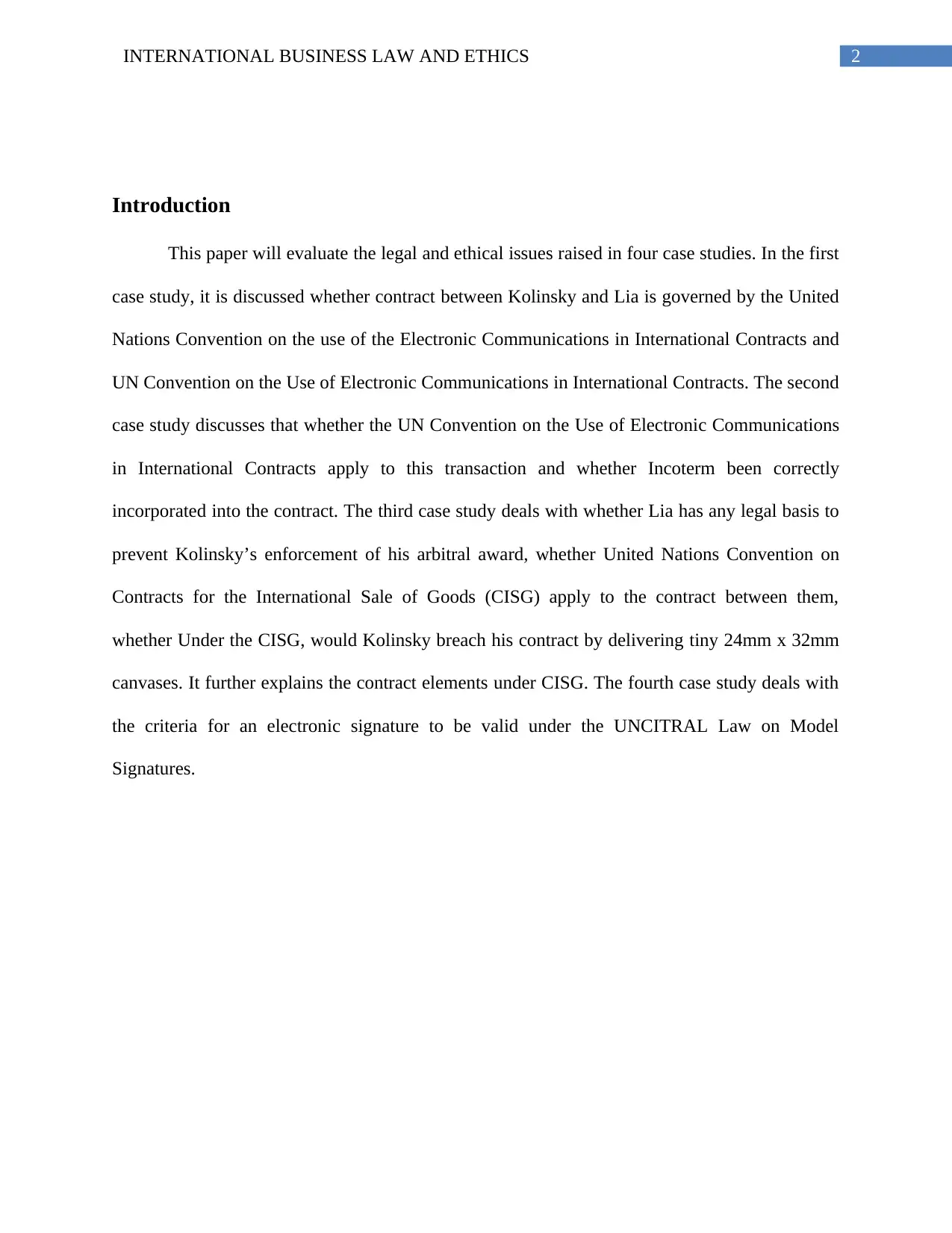
2INTERNATIONAL BUSINESS LAW AND ETHICS
Introduction
This paper will evaluate the legal and ethical issues raised in four case studies. In the first
case study, it is discussed whether contract between Kolinsky and Lia is governed by the United
Nations Convention on the use of the Electronic Communications in International Contracts and
UN Convention on the Use of Electronic Communications in International Contracts. The second
case study discusses that whether the UN Convention on the Use of Electronic Communications
in International Contracts apply to this transaction and whether Incoterm been correctly
incorporated into the contract. The third case study deals with whether Lia has any legal basis to
prevent Kolinsky’s enforcement of his arbitral award, whether United Nations Convention on
Contracts for the International Sale of Goods (CISG) apply to the contract between them,
whether Under the CISG, would Kolinsky breach his contract by delivering tiny 24mm x 32mm
canvases. It further explains the contract elements under CISG. The fourth case study deals with
the criteria for an electronic signature to be valid under the UNCITRAL Law on Model
Signatures.
Introduction
This paper will evaluate the legal and ethical issues raised in four case studies. In the first
case study, it is discussed whether contract between Kolinsky and Lia is governed by the United
Nations Convention on the use of the Electronic Communications in International Contracts and
UN Convention on the Use of Electronic Communications in International Contracts. The second
case study discusses that whether the UN Convention on the Use of Electronic Communications
in International Contracts apply to this transaction and whether Incoterm been correctly
incorporated into the contract. The third case study deals with whether Lia has any legal basis to
prevent Kolinsky’s enforcement of his arbitral award, whether United Nations Convention on
Contracts for the International Sale of Goods (CISG) apply to the contract between them,
whether Under the CISG, would Kolinsky breach his contract by delivering tiny 24mm x 32mm
canvases. It further explains the contract elements under CISG. The fourth case study deals with
the criteria for an electronic signature to be valid under the UNCITRAL Law on Model
Signatures.
⊘ This is a preview!⊘
Do you want full access?
Subscribe today to unlock all pages.

Trusted by 1+ million students worldwide
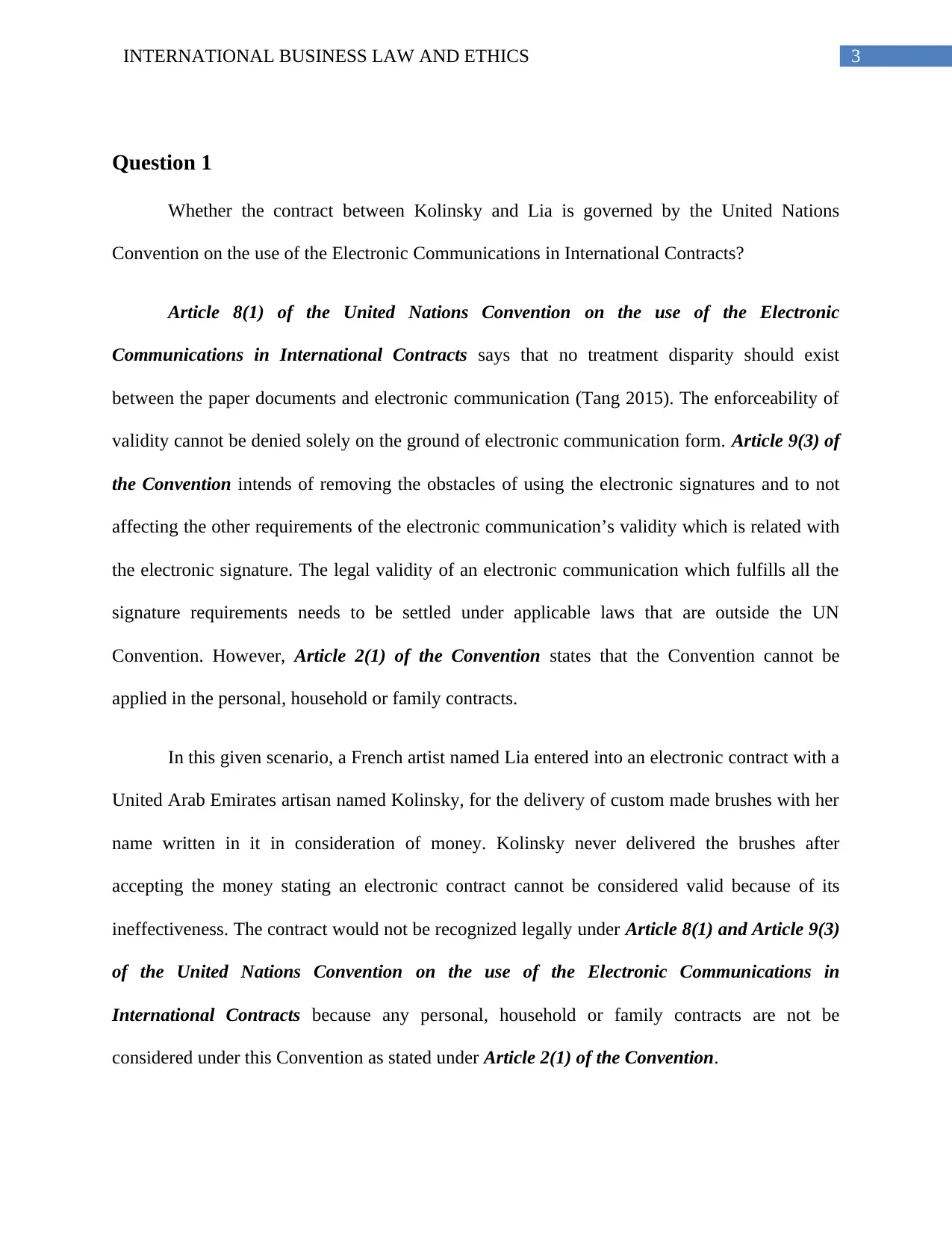
3INTERNATIONAL BUSINESS LAW AND ETHICS
Question 1
Whether the contract between Kolinsky and Lia is governed by the United Nations
Convention on the use of the Electronic Communications in International Contracts?
Article 8(1) of the United Nations Convention on the use of the Electronic
Communications in International Contracts says that no treatment disparity should exist
between the paper documents and electronic communication (Tang 2015). The enforceability of
validity cannot be denied solely on the ground of electronic communication form. Article 9(3) of
the Convention intends of removing the obstacles of using the electronic signatures and to not
affecting the other requirements of the electronic communication’s validity which is related with
the electronic signature. The legal validity of an electronic communication which fulfills all the
signature requirements needs to be settled under applicable laws that are outside the UN
Convention. However, Article 2(1) of the Convention states that the Convention cannot be
applied in the personal, household or family contracts.
In this given scenario, a French artist named Lia entered into an electronic contract with a
United Arab Emirates artisan named Kolinsky, for the delivery of custom made brushes with her
name written in it in consideration of money. Kolinsky never delivered the brushes after
accepting the money stating an electronic contract cannot be considered valid because of its
ineffectiveness. The contract would not be recognized legally under Article 8(1) and Article 9(3)
of the United Nations Convention on the use of the Electronic Communications in
International Contracts because any personal, household or family contracts are not be
considered under this Convention as stated under Article 2(1) of the Convention.
Question 1
Whether the contract between Kolinsky and Lia is governed by the United Nations
Convention on the use of the Electronic Communications in International Contracts?
Article 8(1) of the United Nations Convention on the use of the Electronic
Communications in International Contracts says that no treatment disparity should exist
between the paper documents and electronic communication (Tang 2015). The enforceability of
validity cannot be denied solely on the ground of electronic communication form. Article 9(3) of
the Convention intends of removing the obstacles of using the electronic signatures and to not
affecting the other requirements of the electronic communication’s validity which is related with
the electronic signature. The legal validity of an electronic communication which fulfills all the
signature requirements needs to be settled under applicable laws that are outside the UN
Convention. However, Article 2(1) of the Convention states that the Convention cannot be
applied in the personal, household or family contracts.
In this given scenario, a French artist named Lia entered into an electronic contract with a
United Arab Emirates artisan named Kolinsky, for the delivery of custom made brushes with her
name written in it in consideration of money. Kolinsky never delivered the brushes after
accepting the money stating an electronic contract cannot be considered valid because of its
ineffectiveness. The contract would not be recognized legally under Article 8(1) and Article 9(3)
of the United Nations Convention on the use of the Electronic Communications in
International Contracts because any personal, household or family contracts are not be
considered under this Convention as stated under Article 2(1) of the Convention.
Paraphrase This Document
Need a fresh take? Get an instant paraphrase of this document with our AI Paraphraser
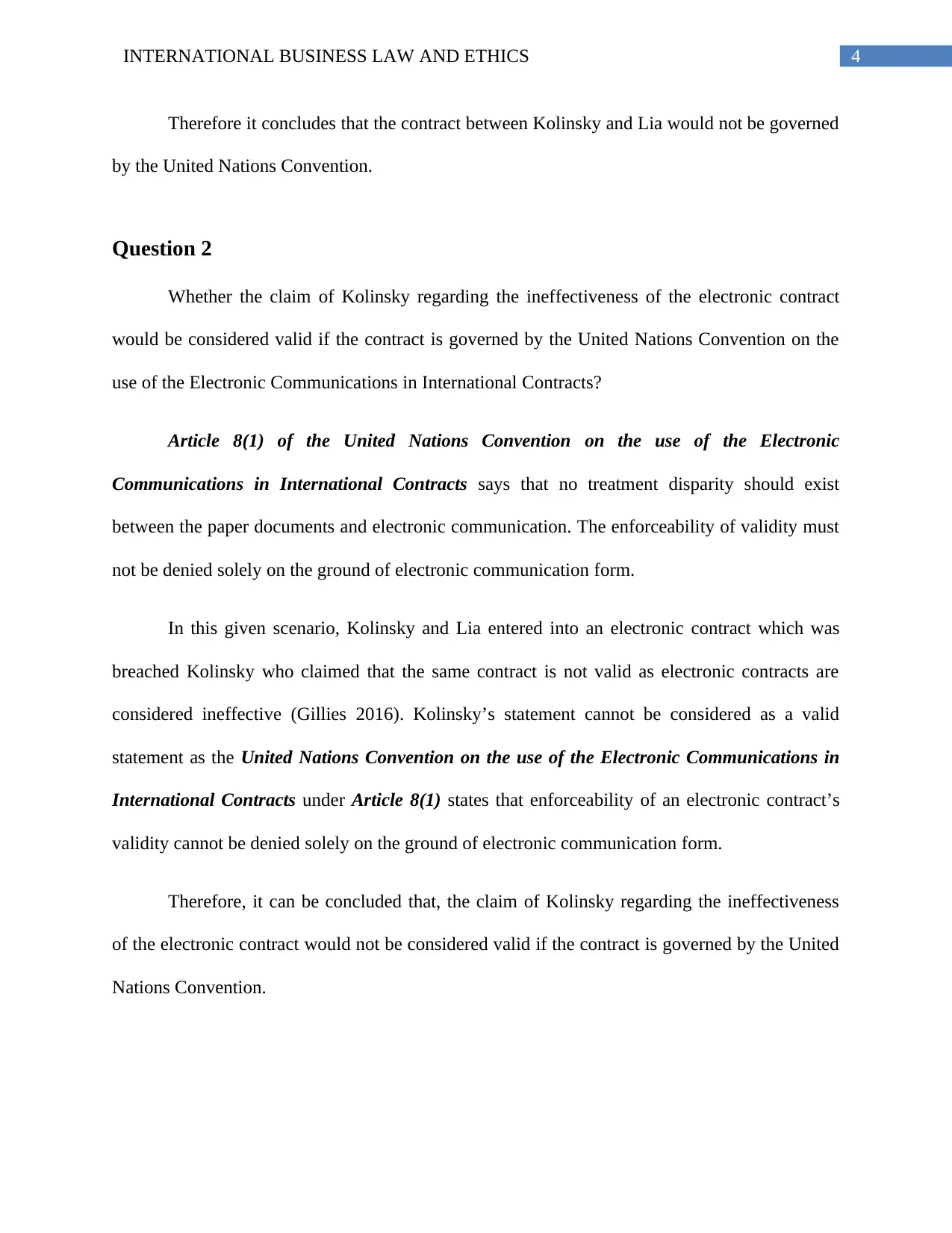
4INTERNATIONAL BUSINESS LAW AND ETHICS
Therefore it concludes that the contract between Kolinsky and Lia would not be governed
by the United Nations Convention.
Question 2
Whether the claim of Kolinsky regarding the ineffectiveness of the electronic contract
would be considered valid if the contract is governed by the United Nations Convention on the
use of the Electronic Communications in International Contracts?
Article 8(1) of the United Nations Convention on the use of the Electronic
Communications in International Contracts says that no treatment disparity should exist
between the paper documents and electronic communication. The enforceability of validity must
not be denied solely on the ground of electronic communication form.
In this given scenario, Kolinsky and Lia entered into an electronic contract which was
breached Kolinsky who claimed that the same contract is not valid as electronic contracts are
considered ineffective (Gillies 2016). Kolinsky’s statement cannot be considered as a valid
statement as the United Nations Convention on the use of the Electronic Communications in
International Contracts under Article 8(1) states that enforceability of an electronic contract’s
validity cannot be denied solely on the ground of electronic communication form.
Therefore, it can be concluded that, the claim of Kolinsky regarding the ineffectiveness
of the electronic contract would not be considered valid if the contract is governed by the United
Nations Convention.
Therefore it concludes that the contract between Kolinsky and Lia would not be governed
by the United Nations Convention.
Question 2
Whether the claim of Kolinsky regarding the ineffectiveness of the electronic contract
would be considered valid if the contract is governed by the United Nations Convention on the
use of the Electronic Communications in International Contracts?
Article 8(1) of the United Nations Convention on the use of the Electronic
Communications in International Contracts says that no treatment disparity should exist
between the paper documents and electronic communication. The enforceability of validity must
not be denied solely on the ground of electronic communication form.
In this given scenario, Kolinsky and Lia entered into an electronic contract which was
breached Kolinsky who claimed that the same contract is not valid as electronic contracts are
considered ineffective (Gillies 2016). Kolinsky’s statement cannot be considered as a valid
statement as the United Nations Convention on the use of the Electronic Communications in
International Contracts under Article 8(1) states that enforceability of an electronic contract’s
validity cannot be denied solely on the ground of electronic communication form.
Therefore, it can be concluded that, the claim of Kolinsky regarding the ineffectiveness
of the electronic contract would not be considered valid if the contract is governed by the United
Nations Convention.
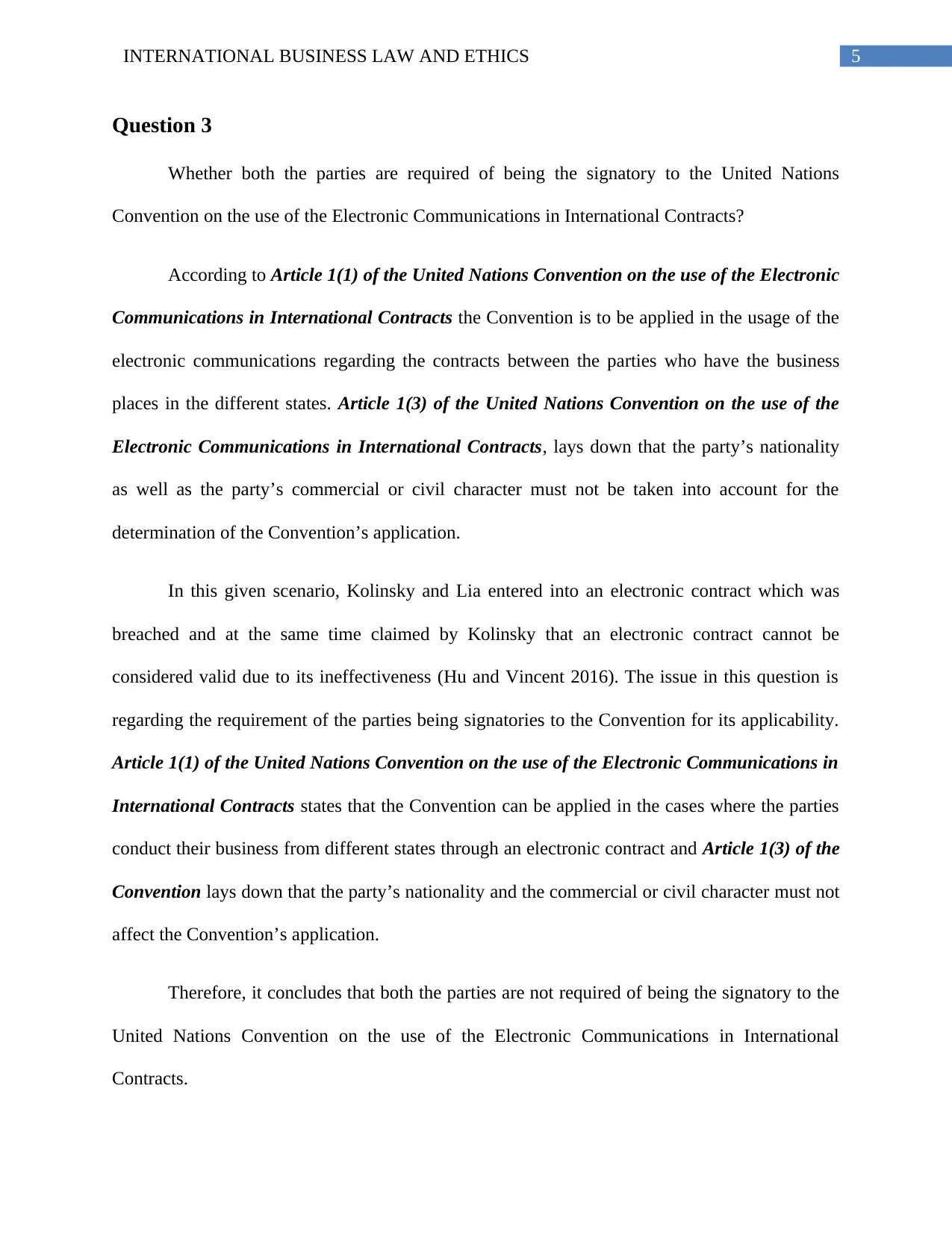
5INTERNATIONAL BUSINESS LAW AND ETHICS
Question 3
Whether both the parties are required of being the signatory to the United Nations
Convention on the use of the Electronic Communications in International Contracts?
According to Article 1(1) of the United Nations Convention on the use of the Electronic
Communications in International Contracts the Convention is to be applied in the usage of the
electronic communications regarding the contracts between the parties who have the business
places in the different states. Article 1(3) of the United Nations Convention on the use of the
Electronic Communications in International Contracts, lays down that the party’s nationality
as well as the party’s commercial or civil character must not be taken into account for the
determination of the Convention’s application.
In this given scenario, Kolinsky and Lia entered into an electronic contract which was
breached and at the same time claimed by Kolinsky that an electronic contract cannot be
considered valid due to its ineffectiveness (Hu and Vincent 2016). The issue in this question is
regarding the requirement of the parties being signatories to the Convention for its applicability.
Article 1(1) of the United Nations Convention on the use of the Electronic Communications in
International Contracts states that the Convention can be applied in the cases where the parties
conduct their business from different states through an electronic contract and Article 1(3) of the
Convention lays down that the party’s nationality and the commercial or civil character must not
affect the Convention’s application.
Therefore, it concludes that both the parties are not required of being the signatory to the
United Nations Convention on the use of the Electronic Communications in International
Contracts.
Question 3
Whether both the parties are required of being the signatory to the United Nations
Convention on the use of the Electronic Communications in International Contracts?
According to Article 1(1) of the United Nations Convention on the use of the Electronic
Communications in International Contracts the Convention is to be applied in the usage of the
electronic communications regarding the contracts between the parties who have the business
places in the different states. Article 1(3) of the United Nations Convention on the use of the
Electronic Communications in International Contracts, lays down that the party’s nationality
as well as the party’s commercial or civil character must not be taken into account for the
determination of the Convention’s application.
In this given scenario, Kolinsky and Lia entered into an electronic contract which was
breached and at the same time claimed by Kolinsky that an electronic contract cannot be
considered valid due to its ineffectiveness (Hu and Vincent 2016). The issue in this question is
regarding the requirement of the parties being signatories to the Convention for its applicability.
Article 1(1) of the United Nations Convention on the use of the Electronic Communications in
International Contracts states that the Convention can be applied in the cases where the parties
conduct their business from different states through an electronic contract and Article 1(3) of the
Convention lays down that the party’s nationality and the commercial or civil character must not
affect the Convention’s application.
Therefore, it concludes that both the parties are not required of being the signatory to the
United Nations Convention on the use of the Electronic Communications in International
Contracts.
⊘ This is a preview!⊘
Do you want full access?
Subscribe today to unlock all pages.

Trusted by 1+ million students worldwide
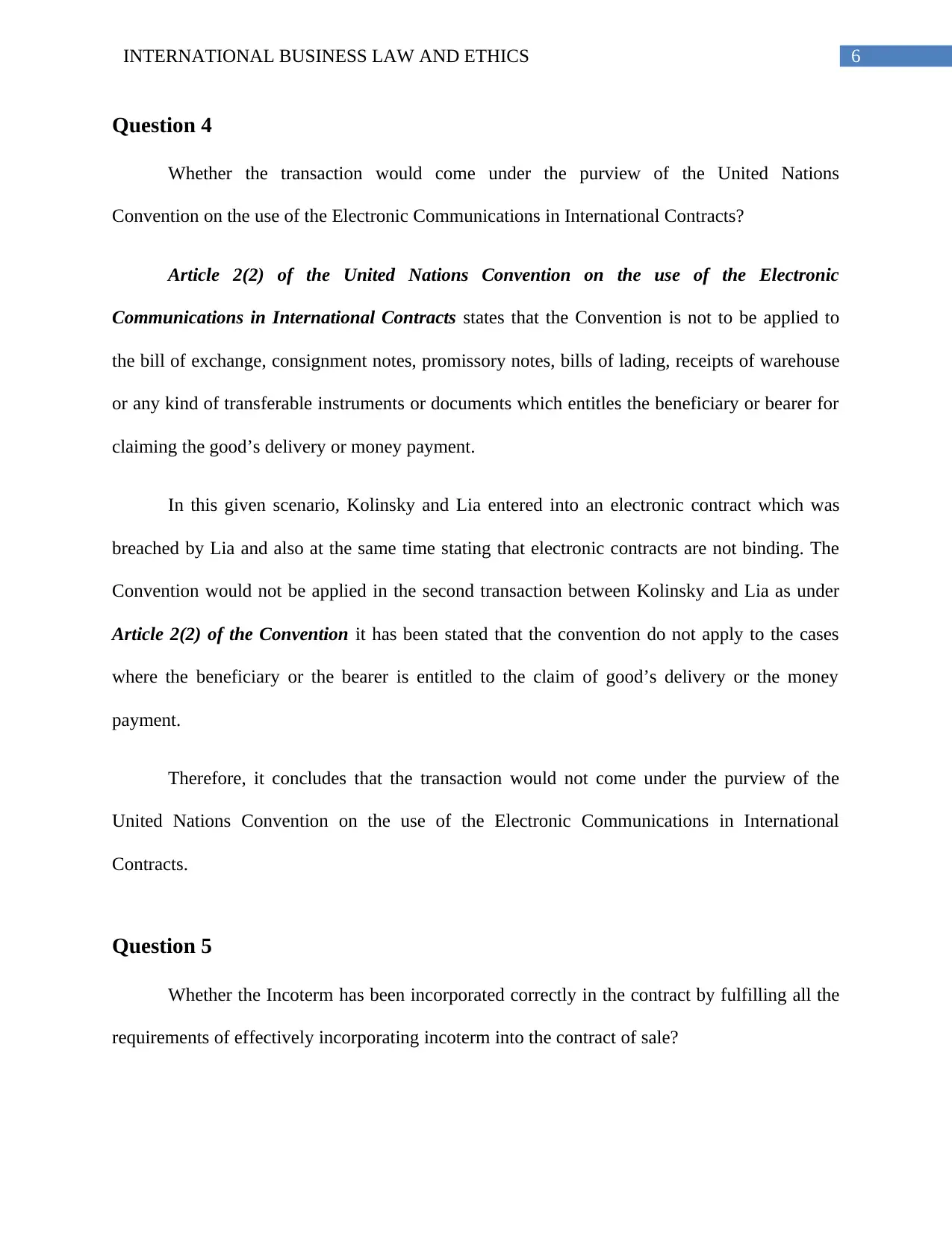
6INTERNATIONAL BUSINESS LAW AND ETHICS
Question 4
Whether the transaction would come under the purview of the United Nations
Convention on the use of the Electronic Communications in International Contracts?
Article 2(2) of the United Nations Convention on the use of the Electronic
Communications in International Contracts states that the Convention is not to be applied to
the bill of exchange, consignment notes, promissory notes, bills of lading, receipts of warehouse
or any kind of transferable instruments or documents which entitles the beneficiary or bearer for
claiming the good’s delivery or money payment.
In this given scenario, Kolinsky and Lia entered into an electronic contract which was
breached by Lia and also at the same time stating that electronic contracts are not binding. The
Convention would not be applied in the second transaction between Kolinsky and Lia as under
Article 2(2) of the Convention it has been stated that the convention do not apply to the cases
where the beneficiary or the bearer is entitled to the claim of good’s delivery or the money
payment.
Therefore, it concludes that the transaction would not come under the purview of the
United Nations Convention on the use of the Electronic Communications in International
Contracts.
Question 5
Whether the Incoterm has been incorporated correctly in the contract by fulfilling all the
requirements of effectively incorporating incoterm into the contract of sale?
Question 4
Whether the transaction would come under the purview of the United Nations
Convention on the use of the Electronic Communications in International Contracts?
Article 2(2) of the United Nations Convention on the use of the Electronic
Communications in International Contracts states that the Convention is not to be applied to
the bill of exchange, consignment notes, promissory notes, bills of lading, receipts of warehouse
or any kind of transferable instruments or documents which entitles the beneficiary or bearer for
claiming the good’s delivery or money payment.
In this given scenario, Kolinsky and Lia entered into an electronic contract which was
breached by Lia and also at the same time stating that electronic contracts are not binding. The
Convention would not be applied in the second transaction between Kolinsky and Lia as under
Article 2(2) of the Convention it has been stated that the convention do not apply to the cases
where the beneficiary or the bearer is entitled to the claim of good’s delivery or the money
payment.
Therefore, it concludes that the transaction would not come under the purview of the
United Nations Convention on the use of the Electronic Communications in International
Contracts.
Question 5
Whether the Incoterm has been incorporated correctly in the contract by fulfilling all the
requirements of effectively incorporating incoterm into the contract of sale?
Paraphrase This Document
Need a fresh take? Get an instant paraphrase of this document with our AI Paraphraser
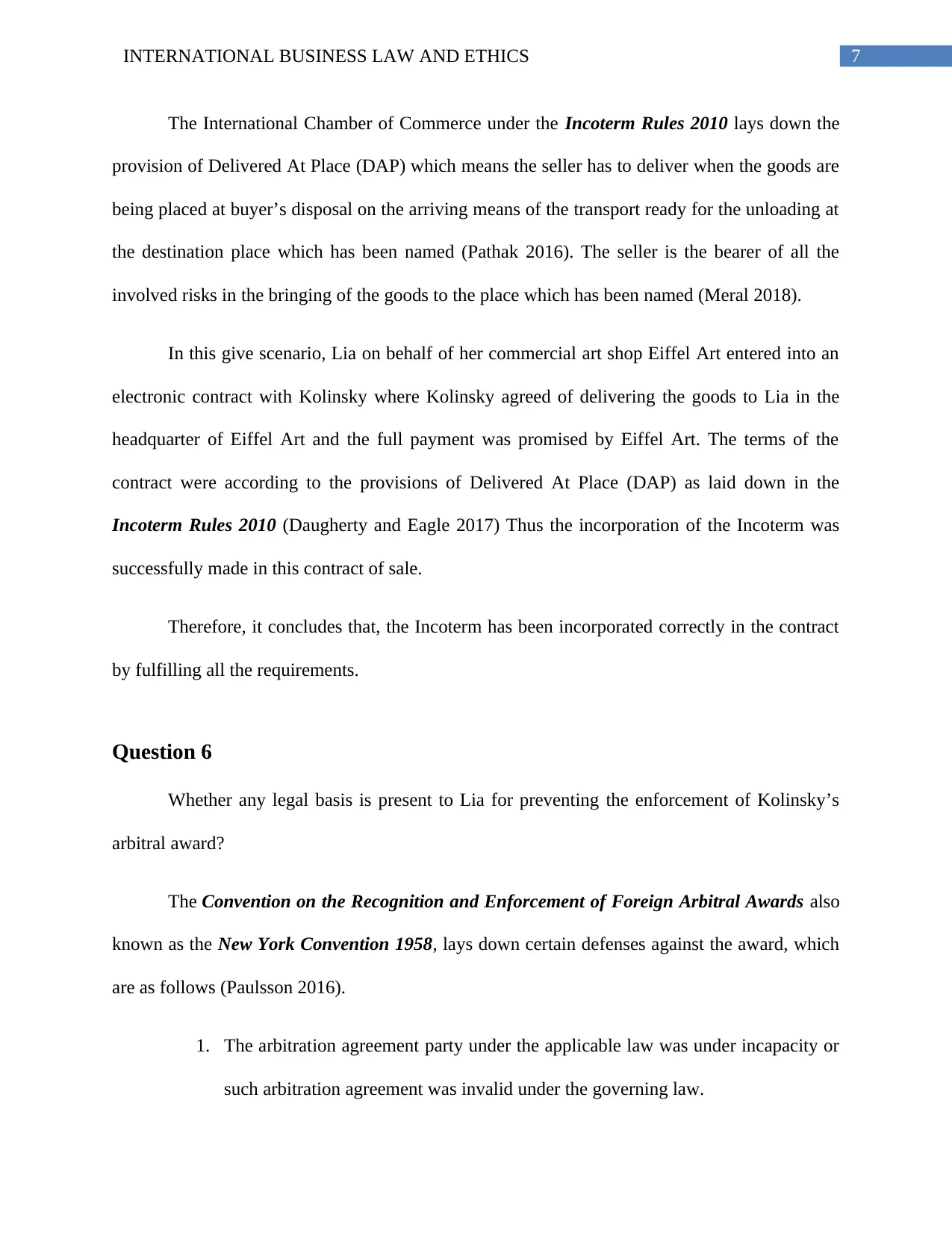
7INTERNATIONAL BUSINESS LAW AND ETHICS
The International Chamber of Commerce under the Incoterm Rules 2010 lays down the
provision of Delivered At Place (DAP) which means the seller has to deliver when the goods are
being placed at buyer’s disposal on the arriving means of the transport ready for the unloading at
the destination place which has been named (Pathak 2016). The seller is the bearer of all the
involved risks in the bringing of the goods to the place which has been named (Meral 2018).
In this give scenario, Lia on behalf of her commercial art shop Eiffel Art entered into an
electronic contract with Kolinsky where Kolinsky agreed of delivering the goods to Lia in the
headquarter of Eiffel Art and the full payment was promised by Eiffel Art. The terms of the
contract were according to the provisions of Delivered At Place (DAP) as laid down in the
Incoterm Rules 2010 (Daugherty and Eagle 2017) Thus the incorporation of the Incoterm was
successfully made in this contract of sale.
Therefore, it concludes that, the Incoterm has been incorporated correctly in the contract
by fulfilling all the requirements.
Question 6
Whether any legal basis is present to Lia for preventing the enforcement of Kolinsky’s
arbitral award?
The Convention on the Recognition and Enforcement of Foreign Arbitral Awards also
known as the New York Convention 1958, lays down certain defenses against the award, which
are as follows (Paulsson 2016).
1. The arbitration agreement party under the applicable law was under incapacity or
such arbitration agreement was invalid under the governing law.
The International Chamber of Commerce under the Incoterm Rules 2010 lays down the
provision of Delivered At Place (DAP) which means the seller has to deliver when the goods are
being placed at buyer’s disposal on the arriving means of the transport ready for the unloading at
the destination place which has been named (Pathak 2016). The seller is the bearer of all the
involved risks in the bringing of the goods to the place which has been named (Meral 2018).
In this give scenario, Lia on behalf of her commercial art shop Eiffel Art entered into an
electronic contract with Kolinsky where Kolinsky agreed of delivering the goods to Lia in the
headquarter of Eiffel Art and the full payment was promised by Eiffel Art. The terms of the
contract were according to the provisions of Delivered At Place (DAP) as laid down in the
Incoterm Rules 2010 (Daugherty and Eagle 2017) Thus the incorporation of the Incoterm was
successfully made in this contract of sale.
Therefore, it concludes that, the Incoterm has been incorporated correctly in the contract
by fulfilling all the requirements.
Question 6
Whether any legal basis is present to Lia for preventing the enforcement of Kolinsky’s
arbitral award?
The Convention on the Recognition and Enforcement of Foreign Arbitral Awards also
known as the New York Convention 1958, lays down certain defenses against the award, which
are as follows (Paulsson 2016).
1. The arbitration agreement party under the applicable law was under incapacity or
such arbitration agreement was invalid under the governing law.
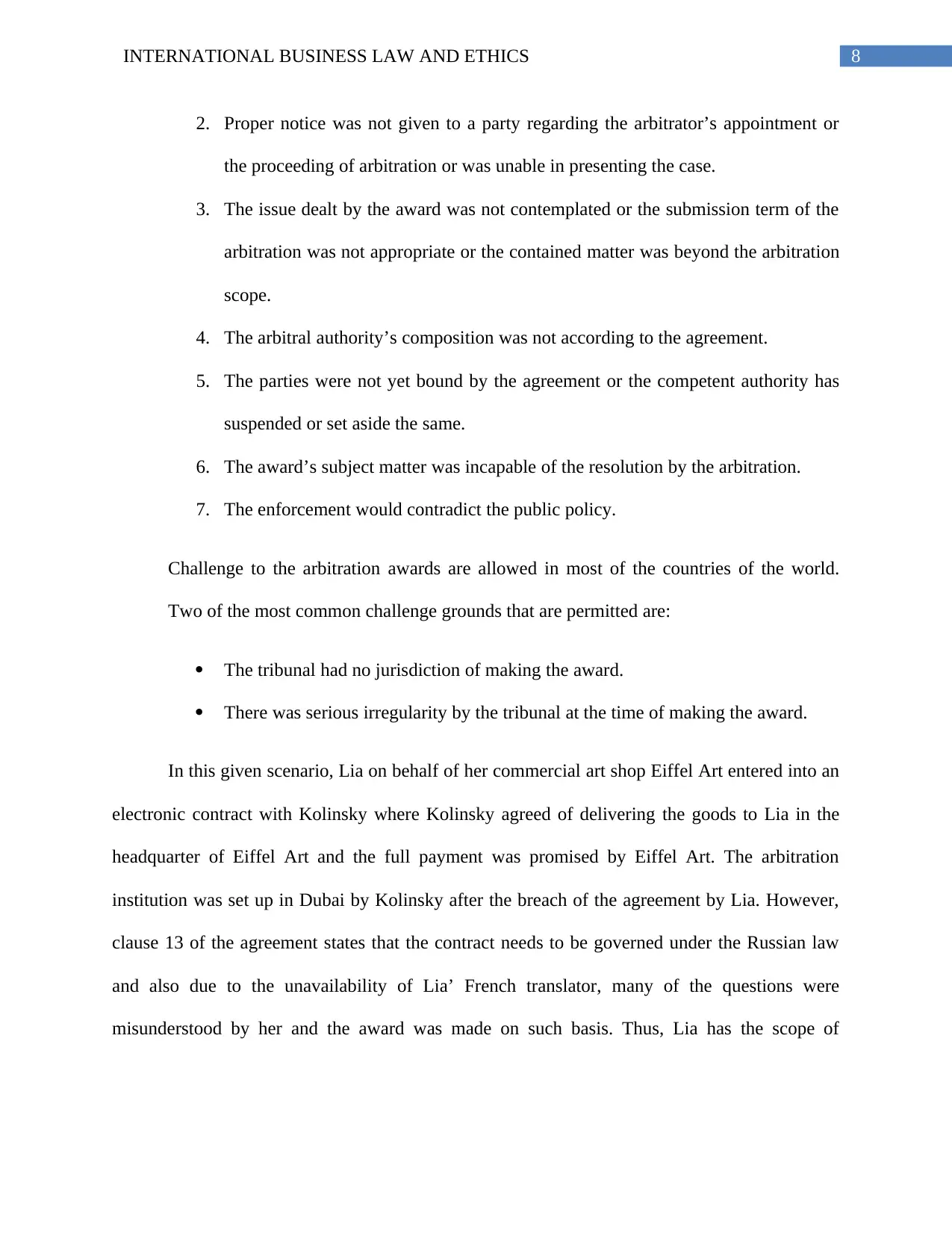
8INTERNATIONAL BUSINESS LAW AND ETHICS
2. Proper notice was not given to a party regarding the arbitrator’s appointment or
the proceeding of arbitration or was unable in presenting the case.
3. The issue dealt by the award was not contemplated or the submission term of the
arbitration was not appropriate or the contained matter was beyond the arbitration
scope.
4. The arbitral authority’s composition was not according to the agreement.
5. The parties were not yet bound by the agreement or the competent authority has
suspended or set aside the same.
6. The award’s subject matter was incapable of the resolution by the arbitration.
7. The enforcement would contradict the public policy.
Challenge to the arbitration awards are allowed in most of the countries of the world.
Two of the most common challenge grounds that are permitted are:
The tribunal had no jurisdiction of making the award.
There was serious irregularity by the tribunal at the time of making the award.
In this given scenario, Lia on behalf of her commercial art shop Eiffel Art entered into an
electronic contract with Kolinsky where Kolinsky agreed of delivering the goods to Lia in the
headquarter of Eiffel Art and the full payment was promised by Eiffel Art. The arbitration
institution was set up in Dubai by Kolinsky after the breach of the agreement by Lia. However,
clause 13 of the agreement states that the contract needs to be governed under the Russian law
and also due to the unavailability of Lia’ French translator, many of the questions were
misunderstood by her and the award was made on such basis. Thus, Lia has the scope of
2. Proper notice was not given to a party regarding the arbitrator’s appointment or
the proceeding of arbitration or was unable in presenting the case.
3. The issue dealt by the award was not contemplated or the submission term of the
arbitration was not appropriate or the contained matter was beyond the arbitration
scope.
4. The arbitral authority’s composition was not according to the agreement.
5. The parties were not yet bound by the agreement or the competent authority has
suspended or set aside the same.
6. The award’s subject matter was incapable of the resolution by the arbitration.
7. The enforcement would contradict the public policy.
Challenge to the arbitration awards are allowed in most of the countries of the world.
Two of the most common challenge grounds that are permitted are:
The tribunal had no jurisdiction of making the award.
There was serious irregularity by the tribunal at the time of making the award.
In this given scenario, Lia on behalf of her commercial art shop Eiffel Art entered into an
electronic contract with Kolinsky where Kolinsky agreed of delivering the goods to Lia in the
headquarter of Eiffel Art and the full payment was promised by Eiffel Art. The arbitration
institution was set up in Dubai by Kolinsky after the breach of the agreement by Lia. However,
clause 13 of the agreement states that the contract needs to be governed under the Russian law
and also due to the unavailability of Lia’ French translator, many of the questions were
misunderstood by her and the award was made on such basis. Thus, Lia has the scope of
⊘ This is a preview!⊘
Do you want full access?
Subscribe today to unlock all pages.

Trusted by 1+ million students worldwide
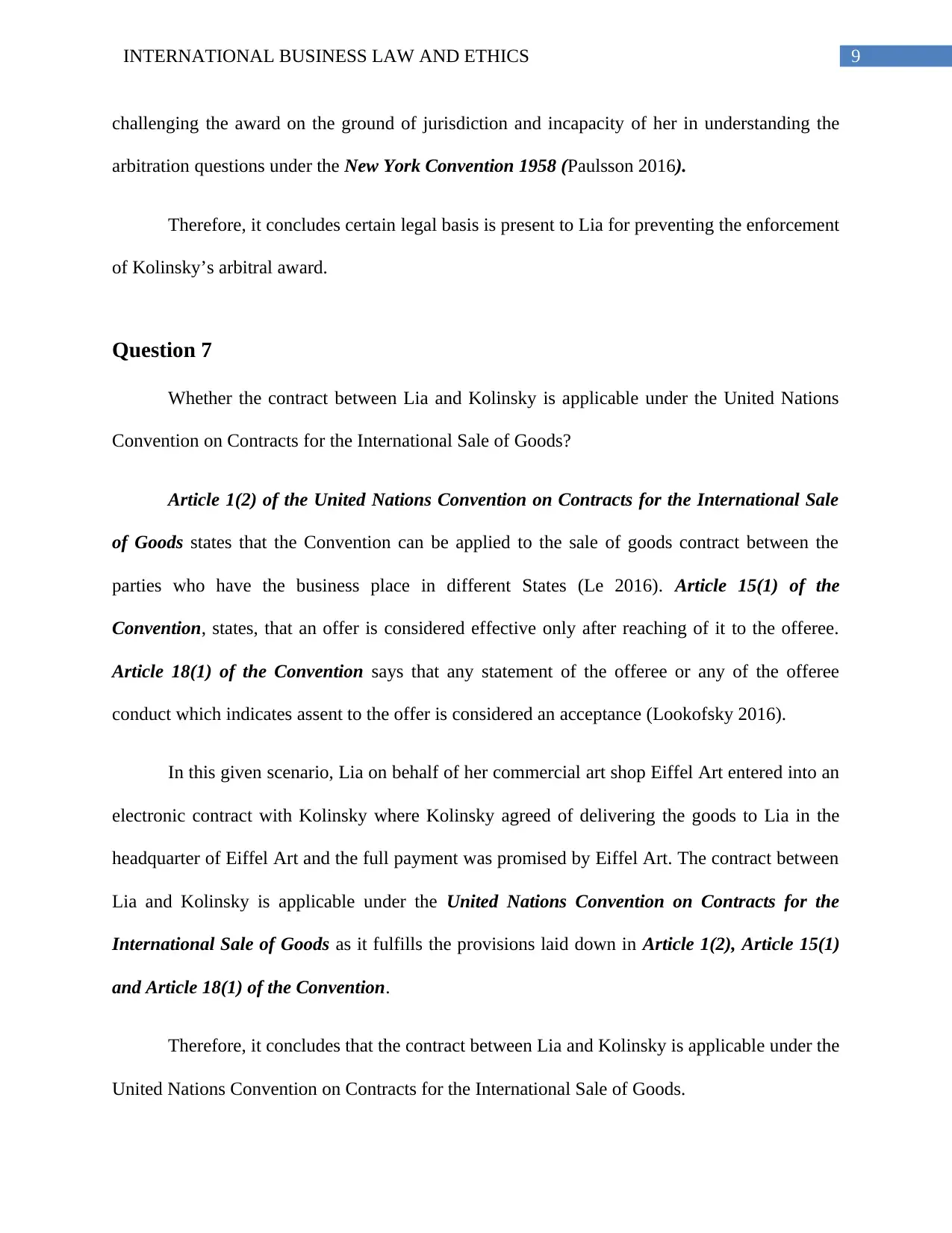
9INTERNATIONAL BUSINESS LAW AND ETHICS
challenging the award on the ground of jurisdiction and incapacity of her in understanding the
arbitration questions under the New York Convention 1958 (Paulsson 2016).
Therefore, it concludes certain legal basis is present to Lia for preventing the enforcement
of Kolinsky’s arbitral award.
Question 7
Whether the contract between Lia and Kolinsky is applicable under the United Nations
Convention on Contracts for the International Sale of Goods?
Article 1(2) of the United Nations Convention on Contracts for the International Sale
of Goods states that the Convention can be applied to the sale of goods contract between the
parties who have the business place in different States (Le 2016). Article 15(1) of the
Convention, states, that an offer is considered effective only after reaching of it to the offeree.
Article 18(1) of the Convention says that any statement of the offeree or any of the offeree
conduct which indicates assent to the offer is considered an acceptance (Lookofsky 2016).
In this given scenario, Lia on behalf of her commercial art shop Eiffel Art entered into an
electronic contract with Kolinsky where Kolinsky agreed of delivering the goods to Lia in the
headquarter of Eiffel Art and the full payment was promised by Eiffel Art. The contract between
Lia and Kolinsky is applicable under the United Nations Convention on Contracts for the
International Sale of Goods as it fulfills the provisions laid down in Article 1(2), Article 15(1)
and Article 18(1) of the Convention.
Therefore, it concludes that the contract between Lia and Kolinsky is applicable under the
United Nations Convention on Contracts for the International Sale of Goods.
challenging the award on the ground of jurisdiction and incapacity of her in understanding the
arbitration questions under the New York Convention 1958 (Paulsson 2016).
Therefore, it concludes certain legal basis is present to Lia for preventing the enforcement
of Kolinsky’s arbitral award.
Question 7
Whether the contract between Lia and Kolinsky is applicable under the United Nations
Convention on Contracts for the International Sale of Goods?
Article 1(2) of the United Nations Convention on Contracts for the International Sale
of Goods states that the Convention can be applied to the sale of goods contract between the
parties who have the business place in different States (Le 2016). Article 15(1) of the
Convention, states, that an offer is considered effective only after reaching of it to the offeree.
Article 18(1) of the Convention says that any statement of the offeree or any of the offeree
conduct which indicates assent to the offer is considered an acceptance (Lookofsky 2016).
In this given scenario, Lia on behalf of her commercial art shop Eiffel Art entered into an
electronic contract with Kolinsky where Kolinsky agreed of delivering the goods to Lia in the
headquarter of Eiffel Art and the full payment was promised by Eiffel Art. The contract between
Lia and Kolinsky is applicable under the United Nations Convention on Contracts for the
International Sale of Goods as it fulfills the provisions laid down in Article 1(2), Article 15(1)
and Article 18(1) of the Convention.
Therefore, it concludes that the contract between Lia and Kolinsky is applicable under the
United Nations Convention on Contracts for the International Sale of Goods.
Paraphrase This Document
Need a fresh take? Get an instant paraphrase of this document with our AI Paraphraser
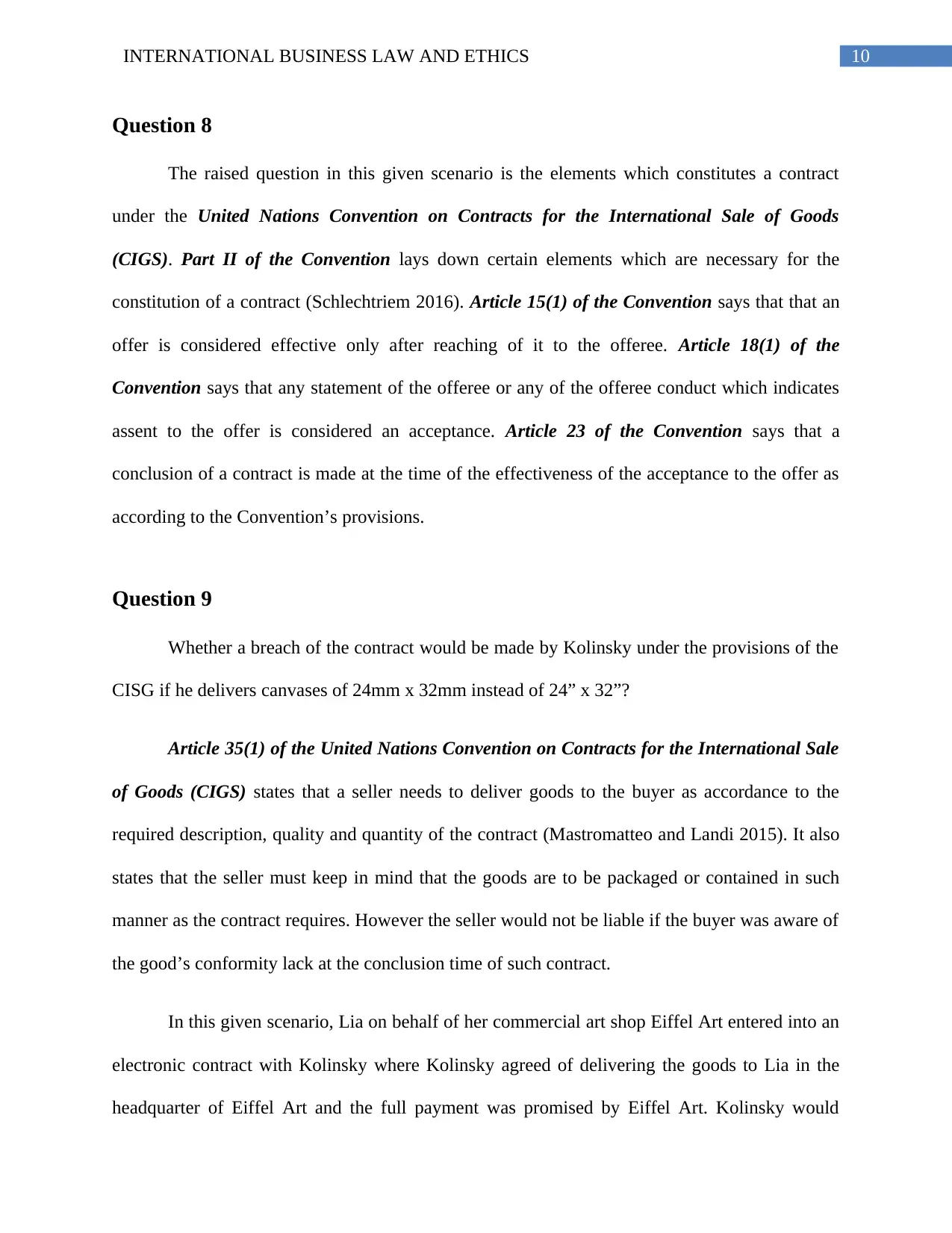
10INTERNATIONAL BUSINESS LAW AND ETHICS
Question 8
The raised question in this given scenario is the elements which constitutes a contract
under the United Nations Convention on Contracts for the International Sale of Goods
(CIGS). Part II of the Convention lays down certain elements which are necessary for the
constitution of a contract (Schlechtriem 2016). Article 15(1) of the Convention says that that an
offer is considered effective only after reaching of it to the offeree. Article 18(1) of the
Convention says that any statement of the offeree or any of the offeree conduct which indicates
assent to the offer is considered an acceptance. Article 23 of the Convention says that a
conclusion of a contract is made at the time of the effectiveness of the acceptance to the offer as
according to the Convention’s provisions.
Question 9
Whether a breach of the contract would be made by Kolinsky under the provisions of the
CISG if he delivers canvases of 24mm x 32mm instead of 24” x 32”?
Article 35(1) of the United Nations Convention on Contracts for the International Sale
of Goods (CIGS) states that a seller needs to deliver goods to the buyer as accordance to the
required description, quality and quantity of the contract (Mastromatteo and Landi 2015). It also
states that the seller must keep in mind that the goods are to be packaged or contained in such
manner as the contract requires. However the seller would not be liable if the buyer was aware of
the good’s conformity lack at the conclusion time of such contract.
In this given scenario, Lia on behalf of her commercial art shop Eiffel Art entered into an
electronic contract with Kolinsky where Kolinsky agreed of delivering the goods to Lia in the
headquarter of Eiffel Art and the full payment was promised by Eiffel Art. Kolinsky would
Question 8
The raised question in this given scenario is the elements which constitutes a contract
under the United Nations Convention on Contracts for the International Sale of Goods
(CIGS). Part II of the Convention lays down certain elements which are necessary for the
constitution of a contract (Schlechtriem 2016). Article 15(1) of the Convention says that that an
offer is considered effective only after reaching of it to the offeree. Article 18(1) of the
Convention says that any statement of the offeree or any of the offeree conduct which indicates
assent to the offer is considered an acceptance. Article 23 of the Convention says that a
conclusion of a contract is made at the time of the effectiveness of the acceptance to the offer as
according to the Convention’s provisions.
Question 9
Whether a breach of the contract would be made by Kolinsky under the provisions of the
CISG if he delivers canvases of 24mm x 32mm instead of 24” x 32”?
Article 35(1) of the United Nations Convention on Contracts for the International Sale
of Goods (CIGS) states that a seller needs to deliver goods to the buyer as accordance to the
required description, quality and quantity of the contract (Mastromatteo and Landi 2015). It also
states that the seller must keep in mind that the goods are to be packaged or contained in such
manner as the contract requires. However the seller would not be liable if the buyer was aware of
the good’s conformity lack at the conclusion time of such contract.
In this given scenario, Lia on behalf of her commercial art shop Eiffel Art entered into an
electronic contract with Kolinsky where Kolinsky agreed of delivering the goods to Lia in the
headquarter of Eiffel Art and the full payment was promised by Eiffel Art. Kolinsky would
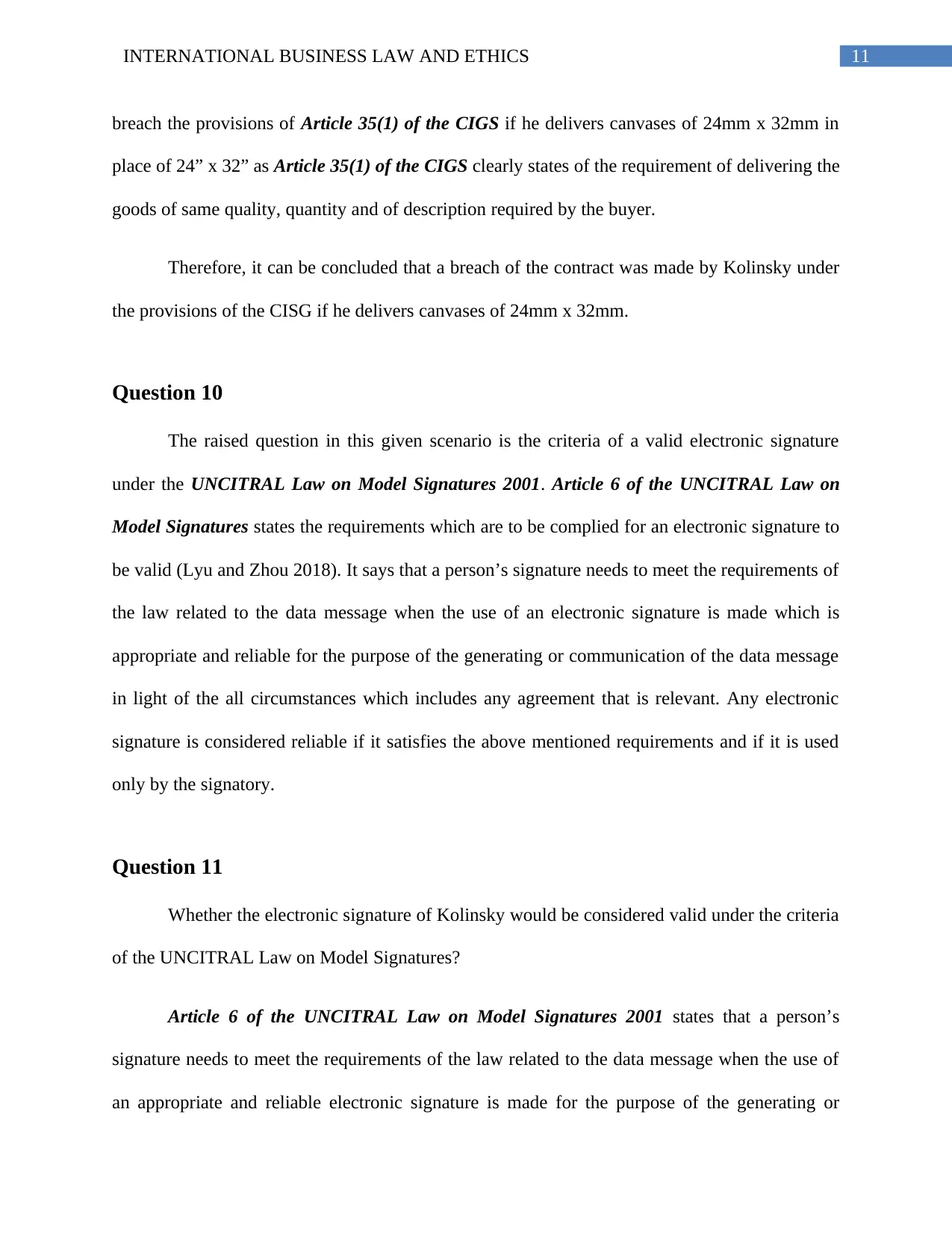
11INTERNATIONAL BUSINESS LAW AND ETHICS
breach the provisions of Article 35(1) of the CIGS if he delivers canvases of 24mm x 32mm in
place of 24” x 32” as Article 35(1) of the CIGS clearly states of the requirement of delivering the
goods of same quality, quantity and of description required by the buyer.
Therefore, it can be concluded that a breach of the contract was made by Kolinsky under
the provisions of the CISG if he delivers canvases of 24mm x 32mm.
Question 10
The raised question in this given scenario is the criteria of a valid electronic signature
under the UNCITRAL Law on Model Signatures 2001. Article 6 of the UNCITRAL Law on
Model Signatures states the requirements which are to be complied for an electronic signature to
be valid (Lyu and Zhou 2018). It says that a person’s signature needs to meet the requirements of
the law related to the data message when the use of an electronic signature is made which is
appropriate and reliable for the purpose of the generating or communication of the data message
in light of the all circumstances which includes any agreement that is relevant. Any electronic
signature is considered reliable if it satisfies the above mentioned requirements and if it is used
only by the signatory.
Question 11
Whether the electronic signature of Kolinsky would be considered valid under the criteria
of the UNCITRAL Law on Model Signatures?
Article 6 of the UNCITRAL Law on Model Signatures 2001 states that a person’s
signature needs to meet the requirements of the law related to the data message when the use of
an appropriate and reliable electronic signature is made for the purpose of the generating or
breach the provisions of Article 35(1) of the CIGS if he delivers canvases of 24mm x 32mm in
place of 24” x 32” as Article 35(1) of the CIGS clearly states of the requirement of delivering the
goods of same quality, quantity and of description required by the buyer.
Therefore, it can be concluded that a breach of the contract was made by Kolinsky under
the provisions of the CISG if he delivers canvases of 24mm x 32mm.
Question 10
The raised question in this given scenario is the criteria of a valid electronic signature
under the UNCITRAL Law on Model Signatures 2001. Article 6 of the UNCITRAL Law on
Model Signatures states the requirements which are to be complied for an electronic signature to
be valid (Lyu and Zhou 2018). It says that a person’s signature needs to meet the requirements of
the law related to the data message when the use of an electronic signature is made which is
appropriate and reliable for the purpose of the generating or communication of the data message
in light of the all circumstances which includes any agreement that is relevant. Any electronic
signature is considered reliable if it satisfies the above mentioned requirements and if it is used
only by the signatory.
Question 11
Whether the electronic signature of Kolinsky would be considered valid under the criteria
of the UNCITRAL Law on Model Signatures?
Article 6 of the UNCITRAL Law on Model Signatures 2001 states that a person’s
signature needs to meet the requirements of the law related to the data message when the use of
an appropriate and reliable electronic signature is made for the purpose of the generating or
⊘ This is a preview!⊘
Do you want full access?
Subscribe today to unlock all pages.

Trusted by 1+ million students worldwide
1 out of 16
Related Documents
Your All-in-One AI-Powered Toolkit for Academic Success.
+13062052269
info@desklib.com
Available 24*7 on WhatsApp / Email
![[object Object]](/_next/static/media/star-bottom.7253800d.svg)
Unlock your academic potential
Copyright © 2020–2026 A2Z Services. All Rights Reserved. Developed and managed by ZUCOL.



